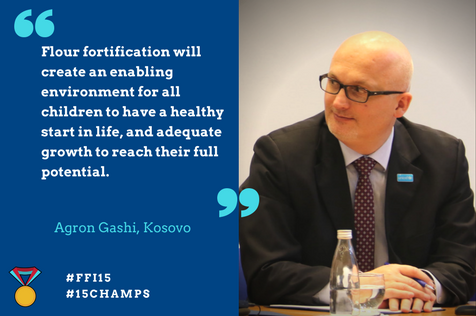#FFI15: Agron Gashi
Health and Nutrition Officer, Head of Health and Nutrition Section at UNICEF Kosovo Office
FFI: How is your country prioritizing fortification?
Gashi: I think that after a long period of time, many organizations are aware and appreciate flour fortification. However, there is still a need to bring together all partners to support flour fortification.I think UNICEF supports by generating evidence and working closely with many partners, Ministry of Health, National Institute of Public Health, Kosovo Agency for Food and Veterinary, Flour Miller Association and many other contributors to understand the importance of addressing micronutrient deficiency.
FFI: What health outcomes do you expect fortification to improve in your country?
Gashi: I expect flour fortification to decrease the rate of anemia and birth anomalies and to improve individual’s capacity and productivity, and to improve the health of pregnant women, especially those in the poorest families. I believe that flour fortification will create an enabling environment for all children to have a healthy start in life, and adequate growth to reach their full potential.
FFI: Is there anything else you would like to share?
Gashi: I want to share that during the programme planning and implementation, I had a life threatening challenge. I managed this and continued thanks to my family, UNICEF, colleagues and motivation to work and do more. Even if something is difficult and considered not possible, I believe nothing is impossible when you work with others and know your objective. Thank you!
FFI: What are the main components to a successful fortification program where you live?
Gashi: Partnership. Partners appreciate UNICEF support. They appreciate FFI support. Leadership is required to implement successful programs. In our case, the key element of a successful program is reliable and solid monitoring mechanisms.

